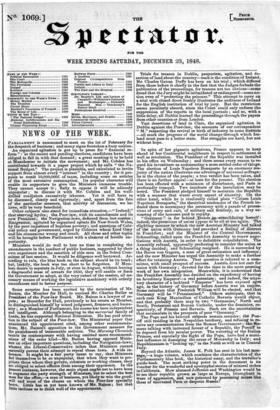In spite of her gigantic agitations, France appears to keep
ahead of her Continental neighbours in respect to settlement as well as revolution. The President of the Republic was installed in his office on Wednesday ; and there seems every reason to re- gard his investiture as commencing a more settled order of things. The election of Louis Napoleon Bonaparte by an enormous ma- jority of the nation illustrates one advantage of universal suffrage: he is the choice of the people; a true verdict has been taken, and there is no further appeal—at least for the present. The election has been effected with a minimum of disturbance, and Paris is profoundly tranquil. Two incidents of the installation may be noted. The President pledged himself to maintain the Republic with a manner that wears every aspect of sincerity. On the other hand, while he is studiously called plain " Citizen Louis Napoleon Bonaparte," the theatrical tendencies of the French in- duced them to accompany the ceremony with a parade of proces- sions of entry and exit, of military and artillery, in a way sa- vouring of the honours paid to royalty. " Germany " is far behind France ..an consoliduting herself : indeed, the promo,ers of union appear to be all at sea again. The slighting manner in which the new Austrian Ministry had talked of the union with Germany had provoked a feeling of distrust in Frankfort ; and the Minister of the Central Government, Schmerling, called upon the Frankfort Assembly to renew nego- tiations with Austria, in order to definitive consolidation. The Assembly refused, apparently preferring to consider the union as a thing decided; and Schmerling resigned. He is succeeded by the Baron von Gagern, a man of great estimation and influence ; and the new Minister has urged the Assembly to make a further effort for retaining Austria. c'That question is referred to a com- mittee, with small prospect of success. Austria does not care for union with Germany ; devoted for the time to the more pressing work of her own integration. Meanwhile, it is understood that the Frankfort Assembly has decided on the expediency of having an hereditary Emperor—a real potentate ; and indeed, the nu..1.a- tory character of a lackland "Emperor" has been exposed ages ago, in the history of Germany before Austria was an empire. Some calculate that Frederick William will be elected, and that Germany will be " Prussianized." Others anticipate, that in such case King Maximilian of Catholic Bavaria would object, and that probably there may be two " Germanies," North and South, Protestant and Roman Catholic, under the dominion, re- spectively, of Prussia and Bavaria. Such are the uncertainties that accumulate in the prospects of poor " Germany."
The Pope and his beloved subjects remain asunder ; the Pon- tiff still residing in the Neapolitan territory, and refusing to re- ceive any communication from the Roman Government ; the Ro- mans talking. with increased favour of a Republic, the Pontiff to be deposed from his secular power. The wavering of the Italian Princes, and especially the flight of the Pope, have had a mani- fest influence in damaging the cause of Monarchy in Italy ; and Republicanism is "looking up," in the North as well as in Central Italy.
Beyond the Atlantic, James K. Polk has sent in his last mes- sage,--a huge volume, which combines the characteristics of the Parliamentary blue book, the historical essay, and the traveller's guide-book. The most striking point in the document is its voucher for the wonderful and apocryphal stories of mineral riches in California. How alarmed Jefferson and Washington would be to see their republic grown as large as Europe, triumphant in wars of aggression, and now poisoned by possessing mines like those of enervated Peru or despotic Russia!


























